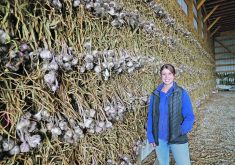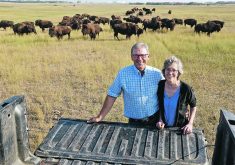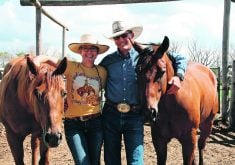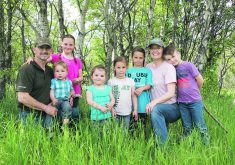Health concerns have forced Delwyn Jansen to slow down this spring, but he can’t ignore the farming call altogether
LEROY, Sask. — Delwyn Jansen thinks curling saved his life.
The east-central Saskatchewan farmer suffered a stroke in February and points to playing dozens of games each winter for keeping him physically fit.
“I’m active, it’s to my benefit,” said the 63-year old.
The health scare has forced changes in his farm life.
“No more working all day or getting up too early,” he said. “You have to take care (of your body) or you’re not going to have it.”
Read Also

Know what costs are involved in keeping crops in the bin
When you’re looking at full bins and rising calf prices, the human reflex is to hold on and hope for more. That’s not a plan. It’s a bet. Storage has a price tag.
Jansen will continue with his recovery and rent out some of his farmland this year.
Far from idle, he was readying equipment and moving it into place for seeding the home quarter.
“I used to have cattle, but I’m alone,” said the bachelor, who farmed with his father, Bernard, until 2014.
His mother, Mathilda, who now lives in Humboldt, said the father and son were close. Jansen completed the University of Saskatchewan’s school of agriculture program but also received much advice about farming from his father.
Bernard died in March.
“It sure hit him hard when his dad passed away. He was always with him,” she said.
She said Bernard was given a fitting sendoff by his grandchildren, who each contributed oats, wheat and peas from the farm to a glass container for the grave.
“He was a farmer, and that’s what he grew,” Mathilda said.
The farm’s 2,000 acres usually included wheat, canola, flax and oats, which Jansen called good for rotations.
He never grows the same crop on the same field two years in a row. As well, he summerfallows and sprays for weed control.
Jansen laments the loss of the Canadian Wheat Board, which provided him with a guaranteed initial price and the promise of more if sales were strong.
“You could bank on that. With the wheat board, you had a bit of control.”
He liked the idea of a company where farmers had a stake, noting the challenges with railroads getting crops to market.
“We should own or have a say in that system,” he said.
He must now do his own marketing, seeking buyers or selling Nexera specialty canola to a contracted company.
Jansen’s farm was homesteaded more than 100 years ago by his grandfather, Gerhard, who arrived in Rosthern, Sask., in 1903 from Indiana.
En route, he met someone with similar German ancestry and they decided to homestead in the Leroy region. Nearby Jansen Lake is named for Gerhard.
He started with a sod shack and then built a two-room log house with a sod roof.
Gerhard married Bertha, and they raised seven children.
“Grandma said it was disgusting living in this house. When the rain was over, it started raining inside,” Jansen said.
The farm grew from those self-sufficient days when farmers raised food to feed the family to a commercial operation today named the Four 20 Farm. It’s named for the four sections occupying section 20.
Mathilda recalled how she first set eyes on Bernard while crawling out of the pigpen on her family’s farm.
She raised five children, managed chickens and hauled grain.
“I’d haul grain all day and at noon, make the lunch, and at night … I’d do the dishes, line up meals for the next day,” said Mathilda.
The farm suffered setbacks, including a fire in the barn and wet harvests when they didn’t get the crop off until the next spring.
These days, Mathilda keeps busy with puzzles, coffee dates and singing engagements with the Silver Bells.
Jansen’s hobbies include collecting grain elevator memorabilia. He is also longtime volunteer crop reporter for Saskatchewan Agriculture.
Looking back to last year, he said it was shaping up to be among the driest years when rain arrived in July and turned things around and made it the eighth wettest year.
Contact karen.morrison@producer.com















